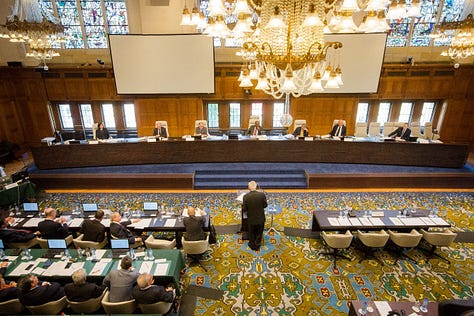

What’s in this episode
On Sunday, April 28, according to The Japan Times, China used its Coast Guard to confront another U.S. ally over another uninhabited, yet strategic, group of tiny islands. This instance involved a group of Japanese lawmakers, who were on an “inspection mission” to the Senkaku Islands, that China officially called an "infringement and provocation".
There are competing narratives about which nation owns this group of eight islands, but just by looking at the map, control of these islands is important to the defense of Taiwan and Japan, who also do not agree on who has sovereignty.
What’s more, it is strongly believed that proximate to these islands and below the seabed lies “what may be the world's largest hydrocarbon reserves,’ according to a report published by Universidad De Navarra and confirmed by the U.S. Energy Information Administration.
It is just this type of armed confrontation that has progressively ratcheted-up concerns of the United States, Britain, Australia, and others, about China’s increasingly belligerent operations to impose its illegal territorial claims in the Pacific region. The frequency and severity of run-ins with Chinese vessels, government-owned and private, is also the basis of the AUKUS agreement, a trilateral strategic defense alliance between the U.S., Britain, and Australia.



In 2013 The Philippines successfully lodged and prosecuted a claim against China regarding activities in the Spratly Islands and other reefs with The Hague’s Permanent Court of Arbitration . The court in 2016 “concluded that there was no legal basis for China to claim historic rights” and “found that China had violated the Philippines’ sovereign rights.”
While the U.S. has been paring down its defense budget, including that of the U.S. Space Force, which officials say is due to Congressional budgetary dysfunction, the other two AUKUS nations, Australia and Britain, plan to increase their defense budgets and investment in space systems.
U.K. Prime Minister Rishi Sunak announced this week his government’s intention “to steadily increase defence spending to 2.5% of GDP by the end of the decade – reaching £87 billion a year in 2030”, and to scale up space capability research and development. Earlier this month, Australia published its new National Defence Strategy, wherein the government wrote that it would deliver “Space capabilities that enhance intelligence, surveillance and reconnaissance, provide resilient communications and counter emerging space threats.”



AUKUS started out in 2021 as a deal to provide conventionally-armed nuclear-powered submarines to Australia, the pact’s first pillar. Pillar 2 requires all to develop advanced capabilities, which includes space systems. It’s under that second part that the three nations in December launched their Deep Space Advanced Radar Capability (DARC) initiative, “to detect, track, identify and characterize objects” in geosynchronous orbit and beyond.
Getting back to Japan, earlier this month, the U.S., Britain, and Australia in a joint statement announced that they were “considering cooperation with Japan on advanced capabilities projects.”
On Wednesday, April 25, Wu Qian, a spokesperson for China’s Ministry of National Defense said, “We firmly oppose relevant countries cobbling together exclusive groupings, building bilateral or multilateral military alliances targeting China, creating division and confrontation and stoking bloc confrontation. The Asia-Pacific is a big stage for peace and development, not a wrestling ground for geopolitical competition." … Queue eye-rolling. ಠ_ಠ.
And if this wasn’t enough, China also just reorganized its military structure, essentially breaking up its Strategic Support Forces into three distinct arms: the Cyberspace Force, the Information Support Force, and the Aerospace Force - China’s equivalent to the U.S. Space Force. While analysts see the efficiencies under this new construct, they also wonder if this is a way of rooting out corruption or emasculating those who may not be completely on board with Chinese President Xi Jinping’s world view.
Thank you to our generous sponsor, TE Connectivity!

Who’s in this episode


Malcolm Davis - Senior Policy Analyst at the Australian Strategic Policy Institute
Juliana Suess - Research Fellow on Space Security at the Royal United Services Institute, and host of the podcast “War in Space”
Some interesting reading
Is this further evidence that Russia is developing a space-based nuclear anti-satellite weapon? Russia vetoes UN vote on stopping arms race in outer space, while China abstained, as reported here on Wednesday, April 24, by Christy Cooney of BBC News. “The resolution also would have called on all Member States not to develop nuclear weapons specifically designed to be placed in orbit,” according to a White House released statement attributed to National Security Advisor Jake Sullivan. The remaining 13 members of U.N. Security Council affirmed the U.S. sponsored resolution.
Here is a video of Juliana Suess’s April 17 oral evidence on the Implications of the war in Ukraine for UK Defence before the House of Lords International Relations and Defence Committee. It’s brilliant!
Articles from Malcolm Davis, all in the past week :
“RIP, SSF: Unpacking the PLA’s Latest Restructuring” by By Ying Yu Lin and Tzu-Hao Liao in The Diplomat is a worthwhile read into the practicalities if China’s military restructuring and what was once the PLA’s Strategic Support Force.
“US to reduce licensing by 80% for UK, Australia to boost AUKUS”, from Reuters details how, “The U.S. Commerce Department is scaling back export control requirements for Australia and the United Kingdom to foster defense trade under the three countries' AUKUS security pact, reducing licensing burdens for trade valued at more than $7.5 billion.”
Have a great week.
Ad Astra,
Laura












